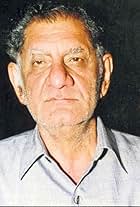Anand Bakshi(1930-2002)
- Music Department
- Writer
- Actor
Anand Bakshi was one of the greatest and popular lyricists of his time.
He was the only lyricist, besides his associate
Majrooh Sultanpuri, who enjoyed such
a long and illustrious career in Bollywood lyricism and was still going
strong after more than 40 years. Like Sultanpuri, Bakshi wrote simple
poetry that could be understood by all, and he was in wide demand by
all filmmakers.
Born in Rawalpindi, 1930, Bakshi was an avid film buff and always dreamt of coming to Bombay and join Bollywood. As his family was against the idea, being composed of mainly bank/military officials, he ran away from home and joined the Navy with the hope of reaching Bombay. But his naval career was cut short with the naval mutiny that occurred in Karachi, and the subsequent partition of India forced him to rejoin his family in Lucknow and take a job as a telephone operator. But he was still determined to go to Bombay, and soon fulfilled his dream.
Initially, he could make no headway. Disillusioned and dejected, he worked in Delhi as a motor mechanic. But Bakshi was persistent and kept coming back to Bombay, and in 1958 he got a chance meeting with the actor Bhagwan Palav, who offered him a job to write the lyrics for his film Bhala Aadmi (1958). Then followed more long periods of struggle until he got his big break in Mehndi Lagi Mere Haath (1962) and Jab Jab Phool Khile (1965), both films by Suraj Prakash. Their success, particularly the latter film with its Kashmiri love story, brought Bakshi to the fore. However it was only with the blockbuster Milan (1967) that he was recognized as a lyricist par excellence, with tunes from the film being hummed all over the country. Anand Bakshi had arrived, and from then there was no looking back for him.
A golden age followed for Bakshi, during which he wrote lyrics for box-office hits like Amar Akbar Anthony (1977), Ek Duuje Ke Liye (1981), Sholay (1975) and his favourite film, Amar Prem (1972) - the first two having been composed by Laxmikant-Pyarelal and the last two by Rahul Dev Burman. He also worked with renowned directors like Raj Kapoor, Subhash Ghai and his close friend Yash Chopra, and composed lyrics for all their successes, notably Bobby (1973) for the socialist Kapoor, Taal (1999) for masala director Ghai and Dil To Pagal Hai (1997) for the romantic Chopra. Indeed, it seemed that for a film to be a box-office success all it needed was great music - and lyrics by Anand Bakshi!
Bakshi's career kept at an all-time high until 30 March 2002, when he passed away in Bombay. He had been quite ill for a few months and had been undergoing treatment for cardiac-related problems. His death was a tragic loss to Bollywood Cinema, especially for those connoisseurs of great music and lyricism. However, even after his death, directors continued to use lyrics he compiled before his death. Such dedication and trust in a lyricist already gone proved why Anand Baskhi was truly one of the elite lyricists of all time...
Born in Rawalpindi, 1930, Bakshi was an avid film buff and always dreamt of coming to Bombay and join Bollywood. As his family was against the idea, being composed of mainly bank/military officials, he ran away from home and joined the Navy with the hope of reaching Bombay. But his naval career was cut short with the naval mutiny that occurred in Karachi, and the subsequent partition of India forced him to rejoin his family in Lucknow and take a job as a telephone operator. But he was still determined to go to Bombay, and soon fulfilled his dream.
Initially, he could make no headway. Disillusioned and dejected, he worked in Delhi as a motor mechanic. But Bakshi was persistent and kept coming back to Bombay, and in 1958 he got a chance meeting with the actor Bhagwan Palav, who offered him a job to write the lyrics for his film Bhala Aadmi (1958). Then followed more long periods of struggle until he got his big break in Mehndi Lagi Mere Haath (1962) and Jab Jab Phool Khile (1965), both films by Suraj Prakash. Their success, particularly the latter film with its Kashmiri love story, brought Bakshi to the fore. However it was only with the blockbuster Milan (1967) that he was recognized as a lyricist par excellence, with tunes from the film being hummed all over the country. Anand Bakshi had arrived, and from then there was no looking back for him.
A golden age followed for Bakshi, during which he wrote lyrics for box-office hits like Amar Akbar Anthony (1977), Ek Duuje Ke Liye (1981), Sholay (1975) and his favourite film, Amar Prem (1972) - the first two having been composed by Laxmikant-Pyarelal and the last two by Rahul Dev Burman. He also worked with renowned directors like Raj Kapoor, Subhash Ghai and his close friend Yash Chopra, and composed lyrics for all their successes, notably Bobby (1973) for the socialist Kapoor, Taal (1999) for masala director Ghai and Dil To Pagal Hai (1997) for the romantic Chopra. Indeed, it seemed that for a film to be a box-office success all it needed was great music - and lyrics by Anand Bakshi!
Bakshi's career kept at an all-time high until 30 March 2002, when he passed away in Bombay. He had been quite ill for a few months and had been undergoing treatment for cardiac-related problems. His death was a tragic loss to Bollywood Cinema, especially for those connoisseurs of great music and lyricism. However, even after his death, directors continued to use lyrics he compiled before his death. Such dedication and trust in a lyricist already gone proved why Anand Baskhi was truly one of the elite lyricists of all time...

























